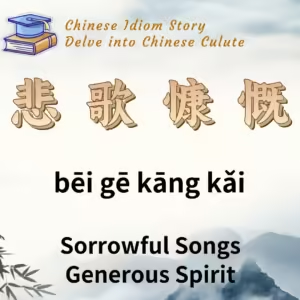
Chinese Idiom: 悲歌慷慨 (Bei Ge Kang Kai)
English Translation: Sorrowful Songs, Generous Spirit
pīn yīn: bēi gē kāng kǎi
Idiom Meaning: It refers to expressing deep emotions through sad songs, typically depicting the plight of heroes in despair or the unfortunate circumstances of valiant warriors.
Historical Source: From Records of the Grand Historian (Shiji) by Sima Qian, specifically the chapter on Xiang Yu.
Idiom Story:
In 202 BC, Liu Bang pursued Xiang Yu and stopped south of Yangxia (an ancient county, now part of Taikang County in Henan Province) to prepare for a meeting with his allies Han Xin and Peng Yue to jointly attack the Chu forces. However, when the meeting date arrived, neither Han Xin nor Peng Yue showed up. The Chu army launched an attack on Liu Bang’s forces, resulting in a significant defeat for the Han army. Liu Bang was forced to retreat into his camp and asked for advice from Zhang Liang.
Zhang Liang advised, “The Chu army is about to collapse. Since Han Xin and Peng Yue have not yet received their fiefs, they are unlikely to come and meet you. If you are willing to divide the territory with them and grant them land, they will surely come. If not, the situation could become unpredictable.” Liu Bang accepted Zhang Liang’s suggestion and sent a message to Han Xin and Peng Yue, stating that after they defeated the Chu army, he would grant territories east of Chen County to Qi Wang and the area north of Suiyang to Peng Yue.
Upon receiving the message, Han and Peng quickly mobilized their forces and converged on Gaixia (an ancient place, now in southern Lingbi County, Anhui), surrounding Xiang Yu. According to Records of the Grand Historian:
“Xiang Wang’s army was besieged at Gaixia, with few troops and no food left. The Han army and allied forces surrounded them on all sides. That night, hearing the Han army singing Chu songs, Xiang Wang was greatly alarmed and said, ‘Have the Han already taken over Chu? Why are there so many Chu people?’ He then got up at night and drank wine in his tent. There was a beautiful woman named Yu who often accompanied him; he also had a fine horse named Zhi that he rode frequently. In this state of despair, Xiang Wang sang a sorrowful song, composing the following lines:
‘With strength to pull mountains, my spirit covers the world;
The times are unfavorable, yet my steed does not advance.
If the steed does not advance, what can I do?
Oh Yu, oh Yu, what can I do?’
In this context, the term “悲歌慷慨” (sorrowful songs and generous spirit) reflects Xiang Yu’s despair as he faces his impending defeat while expressing his emotions through poetry and song. His poignant lament for both his lost cause and his beloved Yu encapsulates the spirit of a hero facing ruin, thus leading to the idiom’s formation.






